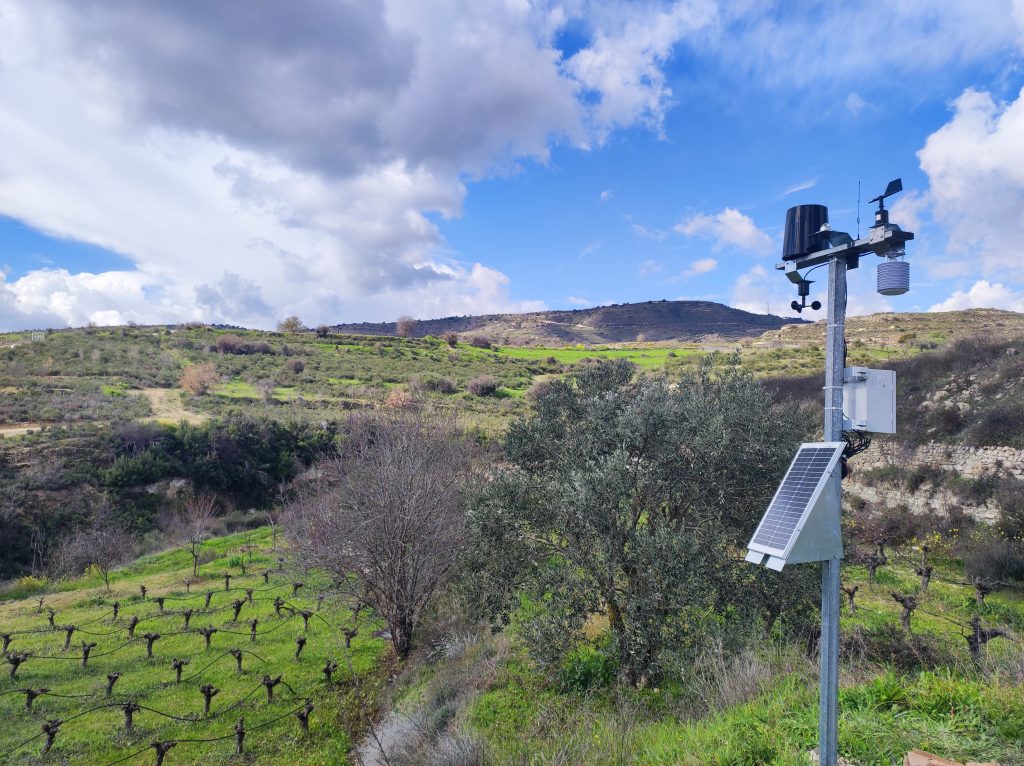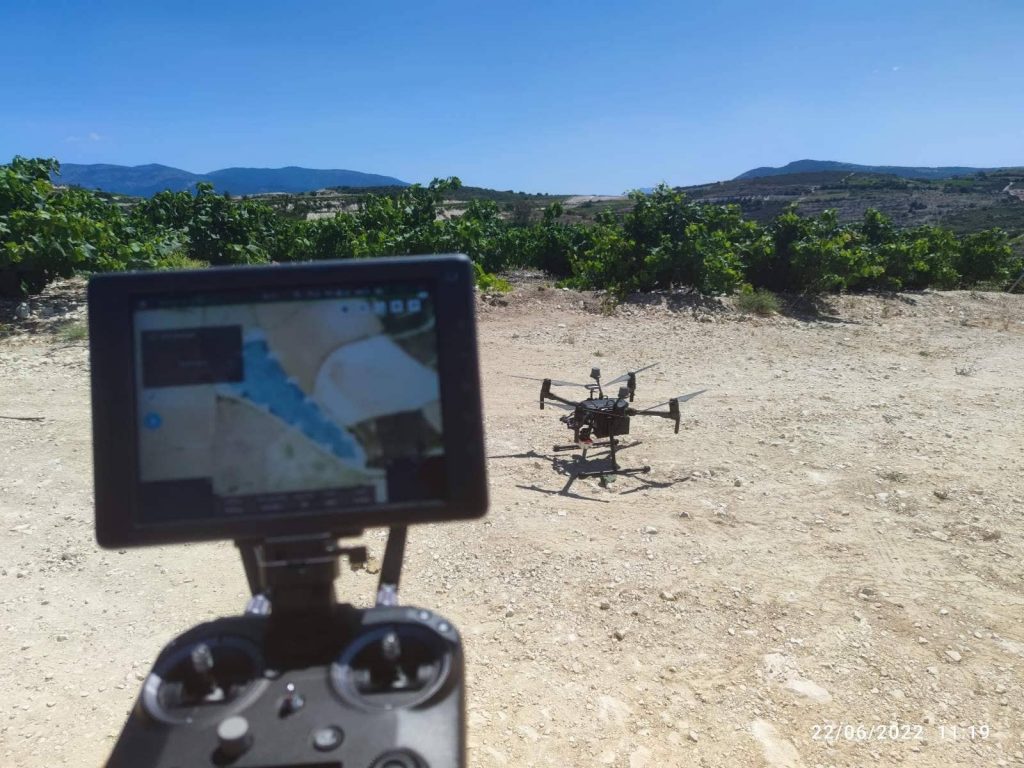
The CypruSaves (Tools for water-saving and field management of Cypriot vineyards) project was one of the five successful pilots chosen to join the DEMETER project as part of Open Call #2 DEPLOY.
The CypruSaves project deploys a high value and impactful pilot in Cyprus vineyards (Limassol & Paphos area) employing DEMETER methodologies and technologies aiming to address farmers’ needs related to water and field management. The project motivates farmers and stakeholders of the sector, through a multi-actor approach using modern technology and tools, like thοse provided by DEMETER, addressing current and future water shortages, and manages their cultivation in terms of soil, yield, nutrients, and pesticide use.
The end-users are provided with online tools and knowledge to be in a position to:
- work with improved IT tools for field management, in terms of water, nutrients, pesticides and soil properties
- calculate the water requirements of their crops and develop the irrigation plan accordingly
- estimate the three components of the water footprint of all processes (green, blue and grey water)
- combine and assess data gathered from sensors, meteorological stations, and project tools to properly adjust their practices
- exploit tools’ communication features to share data, knowledge, information and practices between stakeholders to prove the products’ quality and the level of sustainability
We spoke with Andreas Angeli from Omnia RTD about how farming has changed in recent years in Cyprus and the adoption of digital technologies on farms.
Omnia RTD, is a consultancy company, located in the Republic of Cyprus, providing custom made solutions in the field of Sustainability and Business Development. From Green – Digital Transition, to Intelligent Cities and from Geo-Spatial Big Data Analytics to Agro-Tech, Circular Economy and ESGs, OMNIA’s expertise can range from resource efficiency to cost optimisation and in-house training.
Omnia utilises its expertise to turn innovative ideas into qualitative impactful projects from National and International bodies i.e., Horizon Europe, Interreg, Erasmus+, LIFE+, EUSPA, ESA among others. The team has more than 50 years of combined experience for projects’ management.
What changes have you seen in farming in the last decade?
There has been a growing trend towards organic farming in Cyprus over the last decade. Many farmers have shifted towards organic practices, reducing the use of synthetic fertilizers and pesticides. Organic produce is in high demand both domestically and internationally, and farmers have recognized the economic and environmental benefits of organic farming.
Cyprus faces water scarcity, and efficient water management in agriculture has become a priority. Farmers have adopted water-saving techniques like drip irrigation, which delivers water directly to the roots of plants, minimizing evaporation and optimizing water usage. Additionally, there has been an increased focus on water storage and conservation methods to ensure a sustainable water supply for farming.
Farmers in Cyprus have diversified their crop portfolios, introducing new crops and varieties. For example, there has been a growth in the cultivation of alternative crops like pomegranates, citrus fruits, and olives.
Efforts have been made to support small-scale farmers and encourage their participation in the agricultural sector. Various programs and initiatives have been implemented to provide training, funding, and technical support to small-scale farmers, helping them improve their practices, increase yields, and access markets.
There is an increasing emphasis on sustainable farming practices in Cyprus too. Farmers are adopting techniques such as cover cropping, crop rotation, and integrated pest management to reduce soil erosion, enhance soil fertility, and minimize the use of chemical inputs. This shift towards sustainable practices aims to protect the environment and promote long-term agricultural viability.
Cyprus has been investing in agricultural research and innovation. Research institutions and universities are conducting studies to develop new technologies, crop varieties, and farming techniques suitable for the local conditions. This research contributes to the advancement of the agricultural sector and helps farmers stay updated with the latest knowledge and practices.
In your opinion, what are the biggest drivers in encouraging farmers to adopt digital technologies?
Digital technologies offer farmers the opportunity to optimize their operations, improve efficiency, and enhance productivity.
Digital technologies can help farmers reduce costs in various ways. For example, by using sensors and automation systems, farmers can precisely apply inputs such as water, fertilizers, and pesticides, minimizing waste and saving on expenses.
Climate variability, market fluctuations, and other uncertainties pose risks to agricultural operations. Digital technologies provide farmers with valuable data and predictive analytics that assist in risk management.
Digital technologies offer farmers access to a vast amount of information and knowledge resources. Online platforms, mobile apps, and agricultural extension services provide valuable guidance on best practices, crop management techniques, and market intelligence.
Digital technologies also play a crucial role in promoting sustainable agriculture. By adopting precision agriculture practices, farmers can minimize the use of inputs such as water, fertilizers, and pesticides, reducing their environmental impact. Digital tools also enable better monitoring of soil health, water quality, and biodiversity, allowing farmers to implement conservation practices effectively.
Consumer preferences for transparency, traceability, and sustainable farming practices are increasing. Digital technologies enable farmers to track and record various parameters related to crop production, including origin, cultivation practices, and use of inputs.
Governments and agricultural agencies often provide support, incentives, and funding to encourage farmers to adopt digital technologies. Financial assistance, training programs, and subsidies for investing in digital infrastructure make it more accessible and affordable for farmers to embrace these technologies.

What are farmers’ biggest concerns when adopting digital technologies?
One of the primary concerns for farmers is the cost associated with adopting digital technologies. Investing in hardware, software, sensors, and other necessary infrastructure can be a significant financial burden, especially for small-scale farmers.
Farmers may be concerned about their ability to understand and effectively use digital technologies. Many farmers have limited experience with advanced technologies and may lack the technical knowledge required to implement and operate these systems.
The collection and storage of agricultural data raises concerns about privacy and security is another concern.
Access to reliable and high-speed internet connectivity is critical for the effective adoption of digital technologies. In rural areas, farmers may face challenges in accessing a stable internet connection, which can hinder the use of online platforms, cloud-based services, and real-time data transmission.
Farmers may have concerns about the compatibility and interoperability of different digital technologies. The agricultural sector involves various stakeholders, including equipment manufacturers, software developers, and data providers. It is essential that the systems and tools used by farmers can seamlessly integrate and exchange data to ensure smooth operations and effective decision-making.
Farmers rely on the accuracy and reliability of digital technologies for making critical decisions related to crop management. Concerns may arise regarding the dependability of the technology, such as sensor accuracy, data quality, and system reliability.
Agriculture practices vary across regions, and farmers may question the suitability of digital technologies for their specific local conditions, climate, and crop varieties.
What advice would you give other farmers considering adopting technologies on their farms?
Adopting innovations in farming requires thorough preparation, investigation, and assessment. It is crucial to establish precise objectives, carry out careful studies, begin small and expand gradually, ask for advice, think about return on investment, assess compatibility and security, plan for connectivity, look for ongoing support and training, and keep an eye on results. By taking these actions, farmers will improve farm productivity, sustainability, and profitability while also utilizing technology to its full potential.



